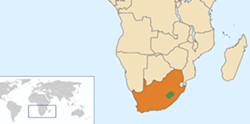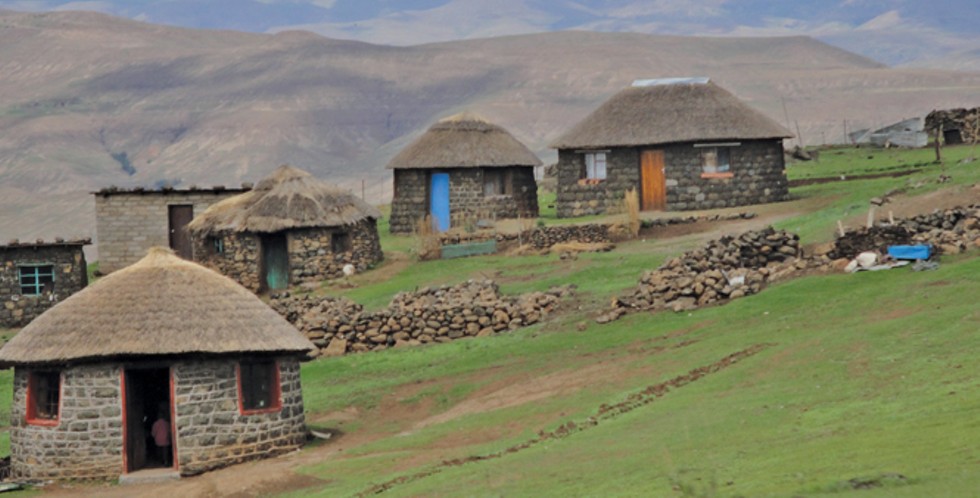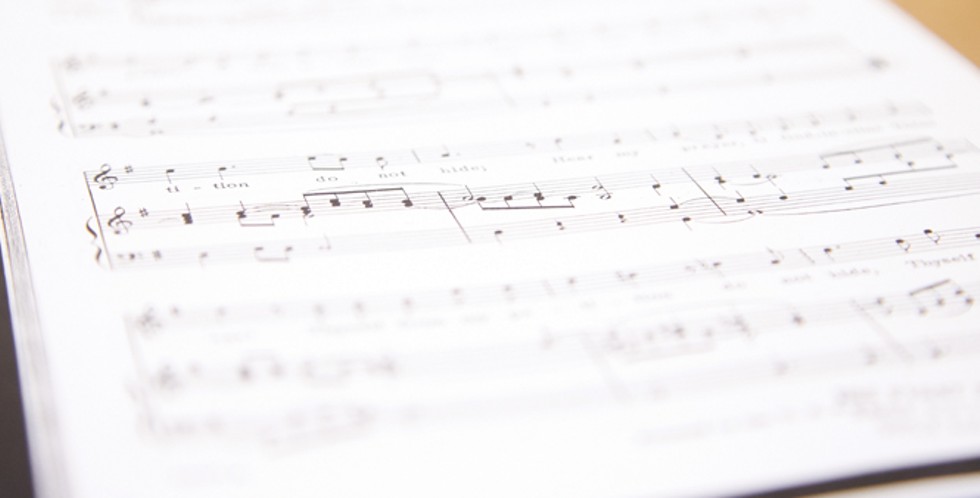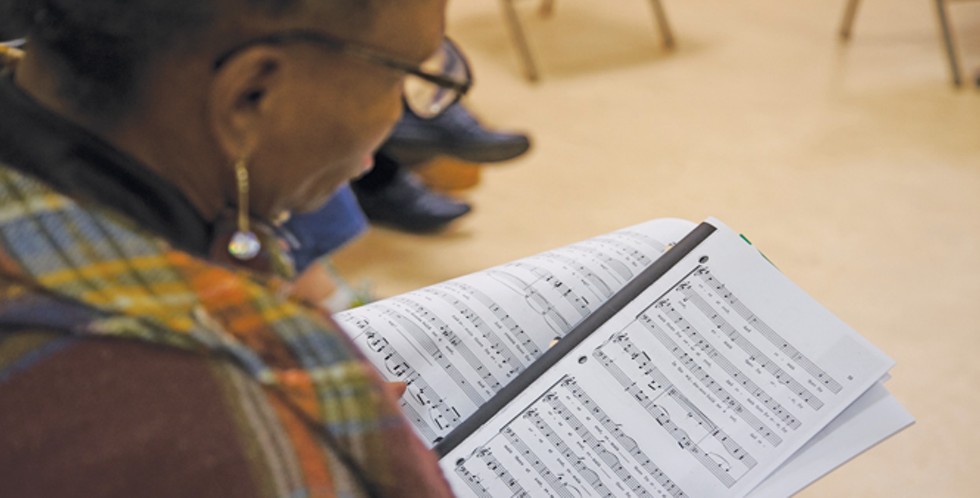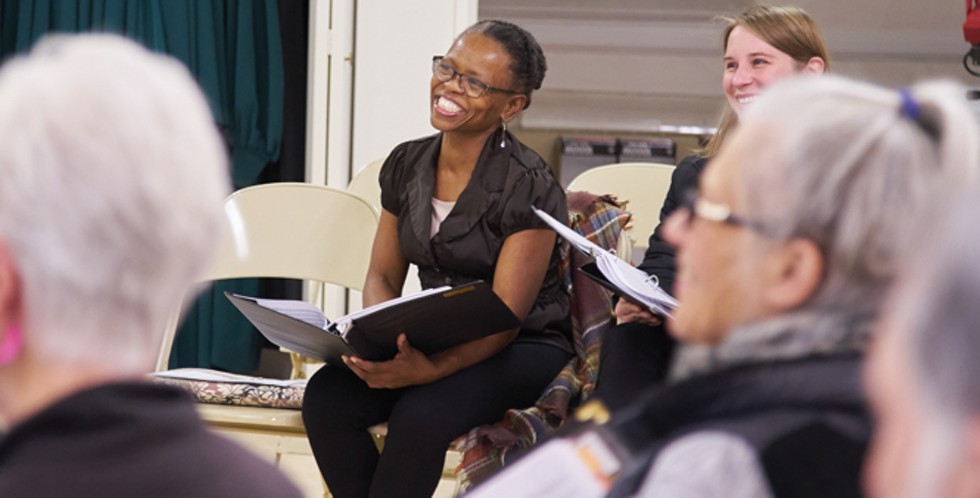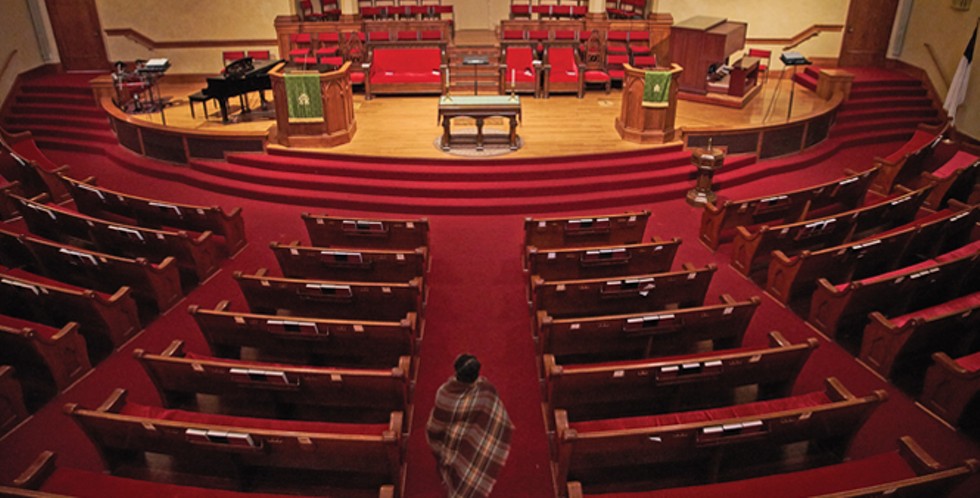Year
Long before she picketed at Weber State University, before she took the LDS Church to court, before a masked gunman threatened her life, before she was shackled by ICE agents and a lifetime before she sang opera to sublimate her anxiety, Victoria Sethunya used to wander into a barren grassland—terrain called the veldt—and dig for edible roots.
Sethunya's home country is Lesotho, a former British colonial enclave surrounded on all sides by South Africa. It gained independence in 1966—the year before she was born. It was against the backdrop of an infant nation—a political tinderbox racked by poverty and crime—where Sethunya lived out her childhood in the manner universally recognized by school children: she tried to fit in with her peers; her parents imposed household rules; she developed schoolyard crushes.
Her family lived in a village suburb of Maseru, the capital city, near enough to the countryside that she and her closest grade-school friend, Ntsoaki, could occasionally escape the bustle and find snacks in the untrammeled dirt every once in awhile.
"We'd take sticks and dig up some roots," she says. "My favorite one was monakalali. This is a tuber. It looks like a little onion; it's sweet, and it leans more alkaline."
Afterwards, Sethunya and Ntsoaki waded into the river to wash up and exfoliate their bare feet against the smooth stones resting on the river's floor. Her vivid memory belies other darker moments of trauma she would one day flee.
Now a resident of South Salt Lake, she traces her journey to Utah.
The second of five children, Sethunya was raised by a cinematographer/composer/sound engineer father, who worked at the local radio station and a special-education teacher mother, who graduated from the University of London.
They lived in a brick home covered by a corrugated roof. Heated by a wood stove, the Sethunya clan often slept in the same room, with the parents in a bed and the children on floor mats. She learned to sing her dolls and younger siblings to sleep.
The household placed a premium value on education. Under her parents' tutelage, she became fluent in Latin, as well as English and Sesotho—the native tongue of the Basotho people. At home, her father required the children to listen to the BBC's afternoon radio news broadcast.
"He'd say, 'Did you listen to the news?' If you said yes, he'd say, 'Tell me what it said. What did it talk about?' We were supposed to report," Sethunya recalls.
Her mother used to sing folk songs while Sethunya learned how to crochet and knit doilies, afghans, hats and scarfs. Her mother was also a skilled cook and passed down culinary knowledge, like what spices to include in dishes for healthy guests versus those who were ill.
"I had great role models growing up," Sethunya says.
Her favorite outdoor spot was the seedbed, where she watched her mom rotate and change the soil with compost. The garden was divided into five plots—one for each child.
"Our parents challenged us to put anything in the soil. That was our land to work with. During the harvest season, we would sell the vegetables to the neighbors," she says.
She learned to turn the soil and then take a sickle and carefully cut patches of moss to cover the budding plants. "To watch the seedlings, this was so amazing," she says. "To transplant the seedlings into the plots, my mom would always tell me, you need to be careful to transfer the roots, so you don't shock them."
Like those vegetables, Sethunya would one day be uprooted—transplanted to a new environment. Her experience reflects one common among immigrants. Settling into a new land, she straddled customs and cultures, and tried to find a place among people, many of whom can't relate to the trauma that shaped her psyche.
Brewing beer and asking questions
Her father, Cletus, had deep political ties. Sethunya learned later in life that he, an avid member of the national party, hid away in a tree at times for his safety. And her mother, she says, was the victim of a random stabbing in the streets of their town. All the while, Sethunya tried to be a kid.
Growing up, she was short for her age, making it hard to make friends with other children who often thought she was younger than she actually was. Standing in a primary school choir, she noticed the other students had sprouted up like beanstalks around her. "I don't think that I fit in in most groups," she says, looking back. "I think maybe I was a little bit self-conscious."
Ntsoaki was an exception. In the winter, Sethunya ran to Ntsoaki's house before school in time to see her friend's mother brewing beer, called joala, in large cast-iron caldrons. While she waited for Ntsoaki to get ready, Sethunya would place a rock close to the fire. The heated rock made an effective hand-warmer that Sethunya carried the rest of the way to school.
Raised Catholic, Sethunya attended a parochial school. Regardless of her difficulty finding friends, Sethunya flourished academically. She retains vivid memories of her teachers: Mr. Graham, who would give each student a problem. They were tasked with walking through each step of the equation in front of the class and told to explain their reasoning. The classroom, she says, was an extension of her studious household.
In the evenings, she tried to return home before dark, a rule imposed by her father. "These are not safe communities. There are people on the street trying to rob you for money, violence, getting stabbed on the street, rape," she now says. At the time, Sethunya wasn't aware of the dangers lurking in the neighborhoods, but only of the admonishment from her father. She would witness the threats firsthand as she grew older and more political. "We took education so seriously," she says. "I think this is where I developed my habit to ask questions. Here, I know I offend so many people just by asking questions."
Sethunya was a well-behaved student, though not without rebellious streaks. She remembers disparaging a teacher whom she didn't believe was providing a quality education. "He was supposed to be teaching us integrated science, but he was reading. I raised my hand, 'I said, 'You're reading. You're not teaching.' I said, 'We can all read.'" She started passing notes to the other students, complaining about the instructor. When the teacher spotted it, he demanded Sethunya give up the paper. Instead of complying, she recalls hopping over desks, imitating a monkey as the teacher ran off to the principal's office. Her punishment: read in the library, which Sethunya found amusing. "This is where I started reading about Jane Austen and Thomas Hardy."
As Sethunya began to blossom into a young adult, she became involved with a group called the Young Christian Student—a youth wing of the African National Congress, the political party that rose to prominence during apartheid South Africa. The late and revered South African President Nelson Mandela was an ANC member when he was elected in 1994.
"This is a different type of Christianity," Sethunya explains, "because this was a type of Christianity that mandated justice. It's not the tone of Christianity that I see in most places." Members of the YCS immersed themselves in discussions about equality, social and economic justice, and they dissected oppressive systems. They asked questions, like, "What happens when a government forgets the people that put it in power?"
It was in this setting where a young man from another village caught Sethunya's eye. The two began corresponding through the mail. Slowly, the letters stopped coming, though. She suspects one of her siblings tampered with the mail, and destroyed letters from her boyfriend. In the end, it didn't matter, because Sethunya met another guy, a bit older than her, who caught her eye at a YCS meeting. "I was nervous that maybe he would consider me too young," she says.
But he didn't, and the two began seeing each other. Sethunya quickly realized this was the man she would one day marry.
Marriage
He was a school principal near the capital city, but she was attracted to his political acumen and his fight for social justice. Their relationship progressed, and one day, her boyfriend's parents visited her father's house. It was to discuss lobola—the payment of money or goods by a groom's family to the bride's in exchange for their daughter. That day, Sethunya's father presented a bill to her future in-laws, but, breaking from tradition, she refused to allow it.
"We just left," she says. "If this is going to be a transaction, then that makes me a commodity, and I'm not."
Lobola, she also notes, makes women feel trapped in abusive relationships because their in-laws, in essence, paid for the bride.
"Everybody was pissed at me," she says, adding that even though her father was educated and enlightened, he supported the dowry tradition because of the money.
Husband and wife would later formalize their union with a Christian wedding, though her family—still stung by her refusal of lobola—did not attend. The couple soon gave birth to a son.
But the honeymoon didn't last. Over time, the relationship grew stale. She moved to a place closer to pharmacy school where she was enrolled, about a 40-minute drive from the school where her husband worked. The physical space exacerbated an emotional divide.
Sensing distance from her husband, Sethunya turned to her Catholic priest for guidance.
It wasn't just that a female student-teacher visited her husband more than seemed necessary, she explained, or the jewelry she found in the car that wasn't hers. It was also her husband opting to stay at the school during the week instead of returning home to sleep. He rationalized it: He said he had a lot of work to do. The necklace was left innocently by his assistant, and the teacher needed extra help. Not to worry.
But she did. In the dead of night once, while pregnant with their second child, she drove around until she found her husband at a party at one of the teacher's houses. The female student-teacher was there with him, as was another woman—and the confidante priest who blessed their marriage.
"I was almost in tears," she says. "It was 2 a.m. They're partying with alcohol, and the priest was there. That's how I left the Catholic Church." Trying to play it cool, her husband told the priest they would have to chat again soon, and he followed her home in his Toyota Corolla.
From there, things only worsened.
A few months later, as she and her brother drove a construction worker home, Sethunya suddenly noticed her husband driving aggressively behind her, waving a metal object. She suspects he was intoxicated. The same erratic behavior manifested another night, when he dragged her out into the barren desert—a similar spot to where she used to unearth roots. She ran back to the village and to her father's home, she says. Despite the turmoil, she finished school and became a pharmacy technician.
One evening, while working alone in the Queen Elizabeth II Pharmacy, she opened a dispensary shutter to see a dark pistol and a face wrapped in cloth. She lunged to the side, slammed the wooden window shut and flipped down a metal pin to lock it. Sethunya remembers dashing to the pharmacy's rear doors to make sure they were locked, too.
"I called Maseru charge [police] office. No answer," she says. She then tried the CID, "an equivalent to the FBI in the U.S." Nothing.
In desperation, she dialed an emergency number, and talked to the operator all night hoping to stay safe.
"The entire evening, a drum is beating in my chest and incessant lightning is striking at the back of my head," she recalls. After that traumatic night, she requested a transfer but was denied. Instead, the police offered an escort, but Sethunya was still terrified. She didn't know whether the assault was random, or tied somehow to her husband, or retaliation for her politics.
"I remain working there, waking up expecting to be shot. Really, just waiting for my burial or [if I could] run," she says.
So she opted to run. Unsure if the gunman was a political operative, someone connected to her husband, or a random robber, she could no longer stay. After she and her then-estranged husband divorced, Sethunya decided, like the state's forefathers, that Utah was the place.
Her journey to the Beehive State began in 1994, when she met two young men with "the same first name" who altered her life trajectory. Political unrest coupled with a fractured marriage, had left her paranoid. So when she saw a pair of white men approaching her one day, dressed in suits befitting a government agent, she turned to dash the other way, but not before one of them was able to call out, "We are priests!" she says. They were Mormon missionaries.
At first skeptical, she soon was enthralled by the idea that God would make himself known through perceptible signs. She started taking the discussions and was baptized. The LDS Church also gave her a sense of purpose. Utah's former Gov. Norman Bangerter served as a mission president in South Africa, which oversaw church activities in neighboring Lesotho, as well. Sethunya says he asked her to work with the missionaries, translate the discussions and also help the young men and women stay in safe areas.
With newly formed religious ties, Utah felt like a plausible spot to start life anew with her three children. Immigrating to the U.S., she settled in Bluffdale.
Utah calling
Once relocated though, even as a member of its predominant faith, Sethunya experienced "otherness." A black woman in a whitewashed state, she believes some people paraded her about to show off their own exotic tastes, while others were unnaturally suspicious of her. Once, she says she was stopped by cops in Salt Lake City's Rose Park neighborhood for driving 5 mph under the speed limit.
Not speaking about this incident specifically, Salt Lake City Police Detective Greg Wilking says police have reasons to pull over motorists for driving too slowly.
"Mostly it may be an indication of impairment," he writes in an email. "Someone going too slow on the freeway could be a safety hazard. Someone who suddenly slows down once an officer is behind them indicates some sort of guilt. Not against the law but suspicious."
In another episode in Morgan, she says she was badgered by a woman, who demanded to know who she was and what business she had in town. Though she didn't respond, Sethunya was walking to have her photo taken at Barr Photography. "She told me if I didn't answer her, she was going to call the police."
The aggressive woman followed her, Sethunya remembers, and only eased after she witnessed Sethunya going to the photo studio.
Matt Barr, the studio owner, remembers Sethunya being upset about the street encounter. He cautions, though, that Morgan generally has been welcoming to people of all backgrounds, but grants that there are "bad apples" in all neighborhoods.
A collegiate activist is born
Securing a student visa, Sethunya moved to Ogden and enrolled in a bachelor's program at Weber State University hoping to breeze through.
"I remember asking one of the professors why I would have to study how aspirin works," she says. "The human anatomy hasn't changed. The chemical hasn't changed. Why can't I just take a test to show what I know?"
WSU, however, didn't reciprocate her prior training, and she wasn't allowed to test out of any courses. Still, she continued going to class over the next four years and earned a degree in English with a minor in chemistry.
Because her immigration status was tied to her schooling, she decided to further her education by earning a master's degree in criminology. But before she graduated, Sethunya was alerted that her records were missing. She inquired at the administration office.
"Everyone was saying, 'Let's see what can be done. Let's figure it out. Let's talk about it,'" she says. "That, for me, meant you lost your immigration status. For them, it was an administrative conversation; for me it was handcuffs."
Sethunya began protesting outside the WSU administration building, picketing with signs. She couldn't help but think that the problem would have been fixed promptly for a person of a different race and ethnicity.
"Even African people have goals," she says. "Even a black woman has goals."
The university says after it noticed that the records of some international students hadn't been transferred to a new software program, it sent out instructions to fix the problem.
The school outlined a list of ways the problem could be resolved. "To the best of our knowledge, Ms. Sethunya is the only student who did not follow the steps outlined," writes Allison Barlow Hess, WSU public relations director via email.
"There is absolutely no basis for the claim of discrimination," Hess continues. "The university provided each international student the same information. When that advice was not followed, the university went to great length to help Ms. Sethunya resolve this matter."
Sethunya unsuccessfully sued the school.
Although she lost in court, she earned her diploma, which was backdated to match her graduating class. Following college, she moved to Millcreek. There, she made friends with a troupe of poets performing at Greenhouse Effect Coffee and Crepes' open-mic sessions.
Her day in court
While the Weber State debacle was resolved, her immigration woes were not. One afternoon, she was approached by immigration officers, handcuffed and driven to a downtown Salt Lake City office.
She asked whether the men had warrants. They did not, she recalls them responding. After a few hours, they cut her loose but told her she would need to appear for a hearing in immigration court.
As her court hearing approached, the poetry community showed up with other protesters in the Salt Lake City courtroom.
"We were there for emotional support," poet RJ Walker says. "We were there to support her so that she didn't feel so afraid. How terrified would you be? This system is a goliath. Having to stare down that is really intimidating. We were there to let her know that we supported her."
The poets and protesters were swiftly kicked out of the courtroom, but Sethunya was able to successfully argue her case. The episode left a sour taste in her mouth and affected the way she viewed Mormons who worked as college administrators or judges.
On Mormonism and transparency
Living in the heart of Mormondom, Sethunya discovered aspects of her faith that had been glossed over during her conversion in her homeland. At the forefront, she was unnerved by the revelation that until 1978, black people were barred from holding the LDS priesthood, a designation that prevented them from serving in high positions or performing sacred rituals.
"That bit of information should have been exposed," she says. "Tell the whole story."
The LDS Church, she reasoned, had the resources to provide poor countries like Lesotho with volumes of information, but it didn't.
She was also disappointed by the way she thought Mormons conducted themselves in church versus their roles in government. She saw homes broken apart because a child identified as LGBTQ, for example, which contradicted her understanding of family values.
And Sethunya concluded that racism stems from LDS scripture. The Book of Mormon explicitly states that God punished a segment of early American settlers (who Mormons believe were the Hebrew ancestors of modern Native Americans) by changing their skin pigment.
"This is a doctrine that justified the oppression of the black people," she says. "I felt like the Mormon doctrine was in concord with racism."
In 2008, Sethunya received a letter from the law firm of Kirton & McConkie informing her that her church welfare assistance was terminated. "Your aggressive behavior and attempts to manipulate Church leaders have created disturbances and violated Church policies," the document stated.
Furthermore, the letter banned her from attending church functions at a nearby ward, or trying to contact LDS General Authorities.
Sethunya was disillusioned and she decided to leave the faith. In 2013, she filed suit against the church, alleging that a former bishop violated her privacy by having in his possession her family medical records. She claims she asked her doctor for documents, but instead of giving them to her, he passed them along to her bishop.
Attorney Benson Hathaway who represented the church declined to comment, but added that the court record speaks for itself: Sethunya's claims were dismissed.
An immigrant voice
Through the trauma, the battles and the contention, Sethunya has chiseled a resilient spirit. She smiles widely when she speaks her mind.
Now, Sethunya has a master's degree in criminology, and with a U visa, her immigration status is secure. She substitutes in Granite School District and teaches ESL classes on her own. She's looking forward to her 50th birthday.
Hardships, as is their nature, continue to ebb and flow—she recently got laid off from a job with a financial institution—but through her journey, she's learned to sing as a way to cope. Sethunya draws on musical talent nurtured in her homeland. On Sundays, she often sings in a local church choir. A recent Wednesday night, she sat at the end of a semicircle with the sopranos in the basement of a Presbyterian church, practicing with nine other choir members.
Sethunya, wrapped in a blanket and holding sheet music, sang softly.
"My PTSD was so aggressive I couldn't contain it," she tells City Weekly. "I had to find a way to let that out. In this country, you cannot show your emotions."
Sethunya paid a retired performer $3 an hour to teach her how to sing opera. She also sought lessons from a music teacher at Weber State. "Learning how to sing opera was one of the most difficult things to do on my own," she says.
Music has also been a way to connect Sethunya with her family.
Sethunya brought her father, Cletus, to the U.S. in 2009 to be closer to her and her three children. Her parents had separated years before; but as devout Catholics, they never divorced. Her mom stayed in Lesotho, but Sethunya says their relationship is still close.Before he died in 2013, Cletus worked on a requiem with Sethunya's daughter. Sethunya says she was too heartbroken to sing at his funeral. "I was shattered," she says.
Last year, Sethunya and her 23-year-old daughter entered an online "American Protégé" singing contest. Sethunya was invited to sing at Carnegie Hall in December 2016. With nerves tingling, Sethunya went on stage before the 500 or so audience members, and sang the requiem she was unable to perform three years earlier.
"I was so fulfilled," Sethunya says. "I was feeling human again."



